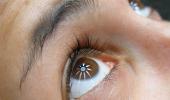Avoid working in poor light.
Take a break at regular intervals; stare at a distant object for at least half a minute so that your eyes can relax says Dr Rohini Shetye.

Our eyes are one of the most important sense organs of our body.
They are our windows to the world and we must ensure that they remain healthy to enable us keep seeing our best.
There are certain things that we can do and others that we may avoid to maintain the health of our eyes.
Dos
1. Have a regular and comprehensive eye exam
You might think your vision is fine or that your eyes are healthy, but visiting your eye care professional for a comprehensive dilated eye exam is the only way to really be sure.
When it comes to common vision problems, some people don't realise they could see better with glasses or contact lenses.
In addition, many common eye diseases such as glaucoma, diabetic eye disease and age-related macular degeneration often have no warning signs.
A dilated eye exam is the only way to detect these diseases in their early stages.
2. Wear corrective eye glasses
You should wear the appropriate corrective prescription glasses as per the instructions by your health care professional.
Also be sure to get them checked regularly and change them if needed.
3. Healthy reading habits
While reading, keep the reading material at least 30 cm away from your eyes.
While working with computers keep optimal distance between your eyes and the screen.
Take a break at regular intervals; stare a distant object for at least half a minute so that your eyes can relax.
4. Know your family’s eye history
Certain diseases or conditions affecting the eyes are hereditary.
Talking to your family members will help you know about their eye health history and whether you are at risk for developing such conditions.
5. Eat healthy
A diet rich in fruits and vegetables, particularly dark leafy greens such as spinach, and other vegetables like carrots, broccoli; fruits like papaya, mangoes, is important for keeping your eyes healthy.
These contain lutein, an antioxidant and beta carotene that protects the eyes from damage and boosts eye health.
Research has also shown there are eye health benefits from eating fish high in omega-3 fatty acids.
6. Wear protective eye wear
Wear protective eyewear when playing sports or doing activities around the home.
Protective eyewear includes safety glasses and goggles, safety shields, and eye guards specially designed to provide the correct protection for a certain activity.
7. Wear appropriate sunglasses
Sunglasses especially ones that block out 99 to 100 percent of both UV-A and UVB radiation are necessary to protect our eye from the harmful solar radiation.
Solar radiation can cause cataract and age related macular degeneration.
8. Clean your hands
To avoid the risk of infection, always wash your hands thoroughly before putting in or taking out your contact lenses.
Make sure to disinfect contact lenses as instructed and replace them as appropriate.
9. Rest your eyes
Ensure adequate sleep to give your eyes a well-deserved rest.
DON'Ts
If you really want to take care of your vision, here are some habits you may want to take care of.
1. Smoking
Smoking is as bad for your eyes as it is for the rest of your body.
It carries an increased risk of developing age-related macular degeneration, cataract, and optic nerve damage, all of which can lead to blindness.
2. Rubbing your eyes
Vigorously rubbing your eyes can increase the chances of allergic eye diseases and also vision disturbing problems like keratoconus.
3. Excessive digital screen use
Avoid the excessive use of digital screens like laptops, smartphones, and tablets as they can be potentially harmful apart from causing eye strain.
4. Staring at bright sources of light
Avoid staring at the sun and other bright objects such as headlights, bright lights and laser pointers.
This is extremely harmful to your eyes and can affect your vision.
Even while watching TV or staring at computer screen, dim them a bit too so that they are not harsh on your eyes.
5. Work in poor light
Working in poor light causes strain on the eyes and subsequent fatigue and headache.
Make sure that the light is adequate and of soft quality so as to keep your eyes comfortable.
6. Sleeping with your contact lenses in
Never leave contact lenses in your eyes while sleeping.
This can lead to infections and decreased oxygen supply to the eye.
Also do not use tap water, saliva or any such liquids to moisten the contact lenses before insertion.
7. Ignore eye symptoms
Sometimes serious eye problems like glaucoma and cataract may cause mild symptoms like blurring of vision.
Do not ignore any eye symptoms.
Get even the mildest of red eye checked by your eye health care professional.
8. Seek over the counter medications
Any eye symptom needs to be thoroughly examined which can be done only by your eye care professional.
Over the counter medication or alternate, unverified forms of treatment and medication may cause temporary or permanent, irreversible damage.
Dr Rohini Shetye is ophthalmologist, K J Somaiya Hospital and Research Centre, Mumbai.










